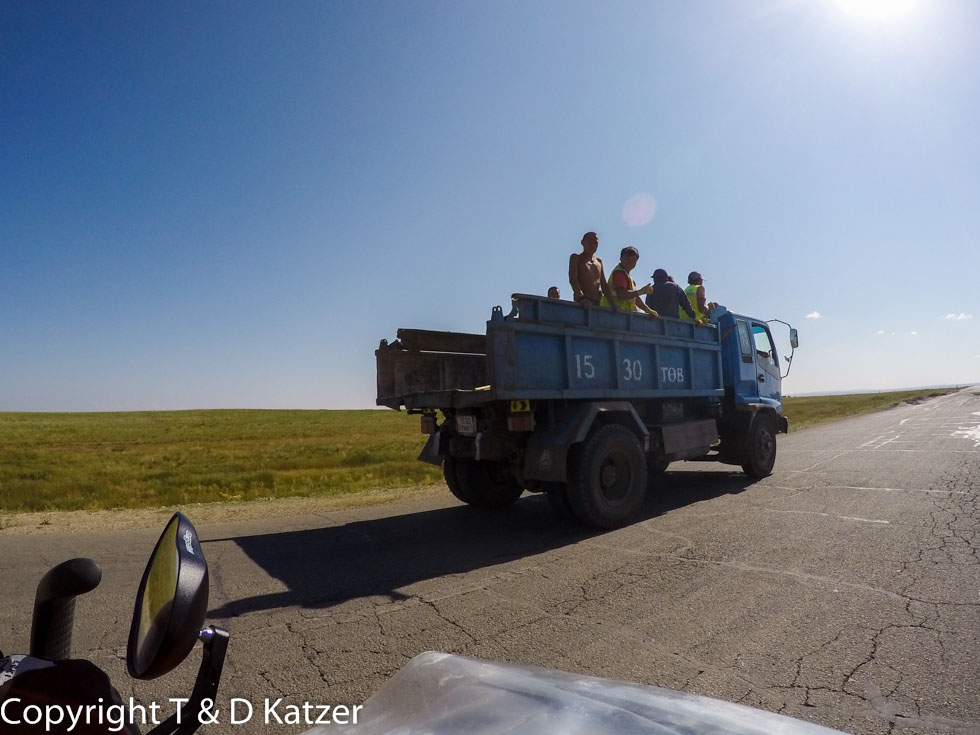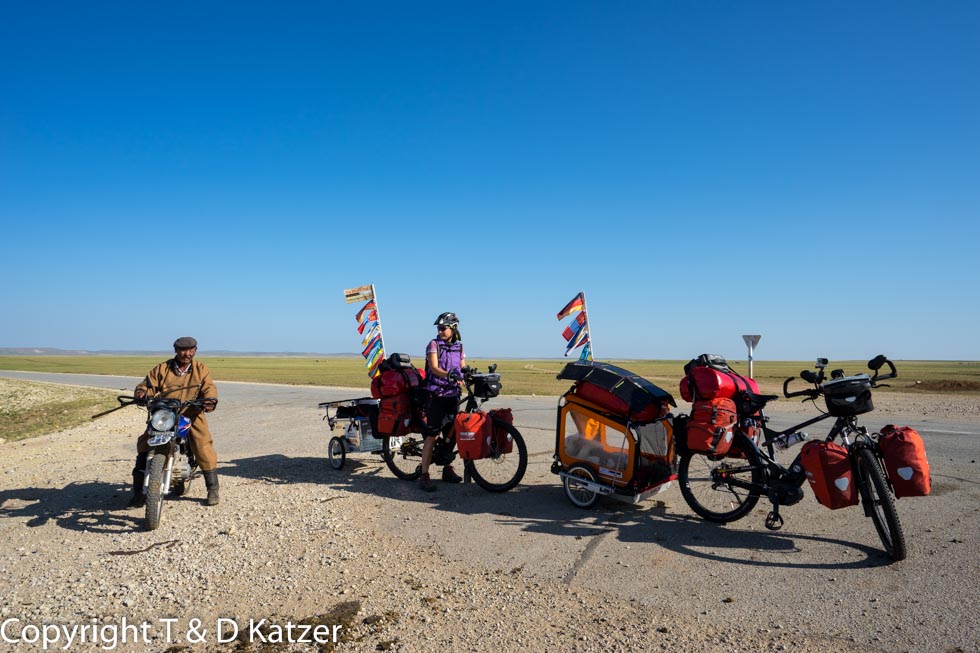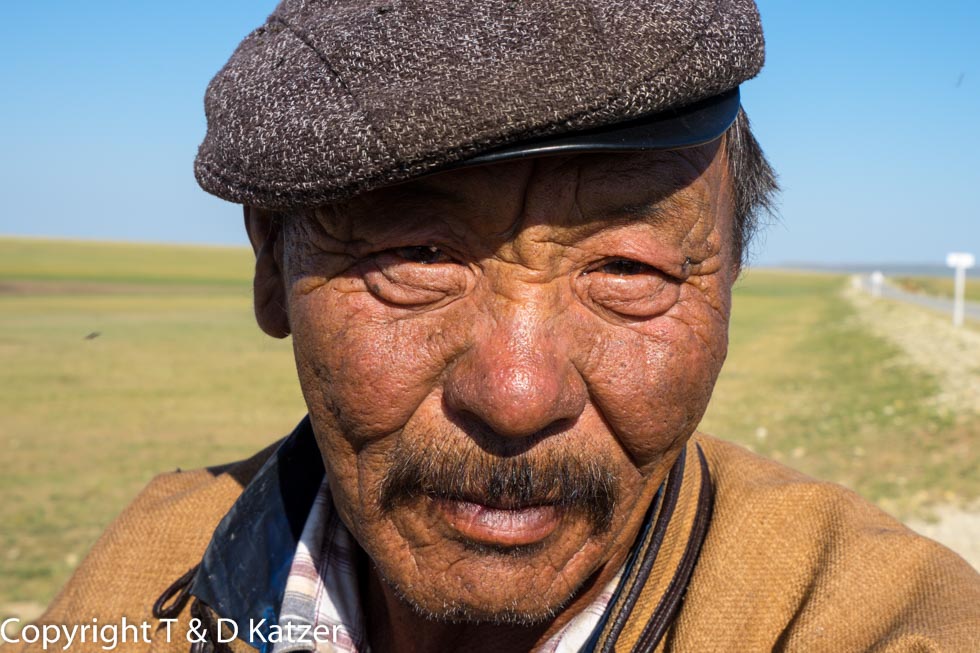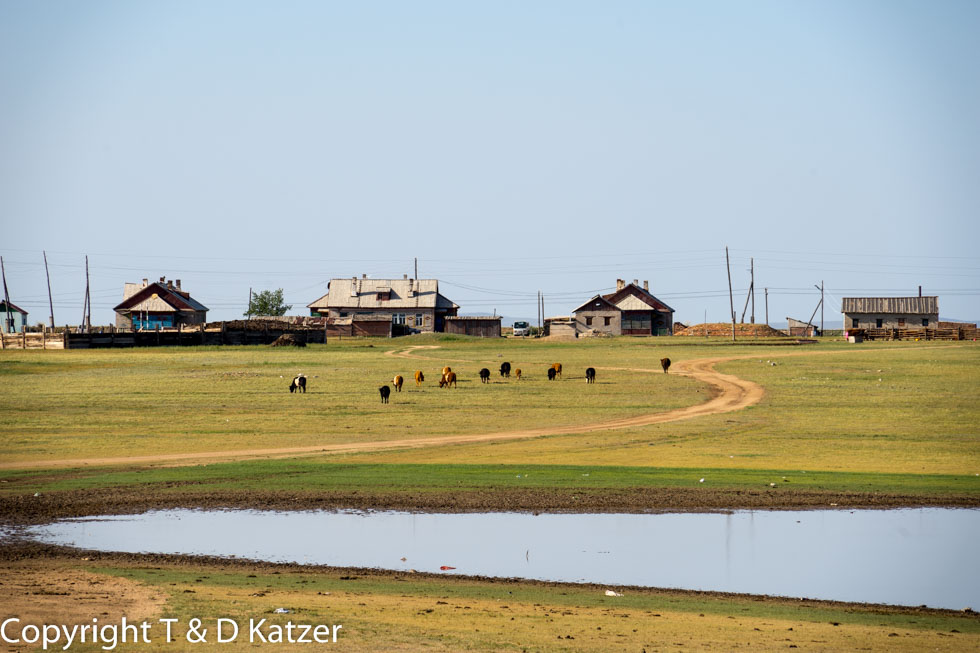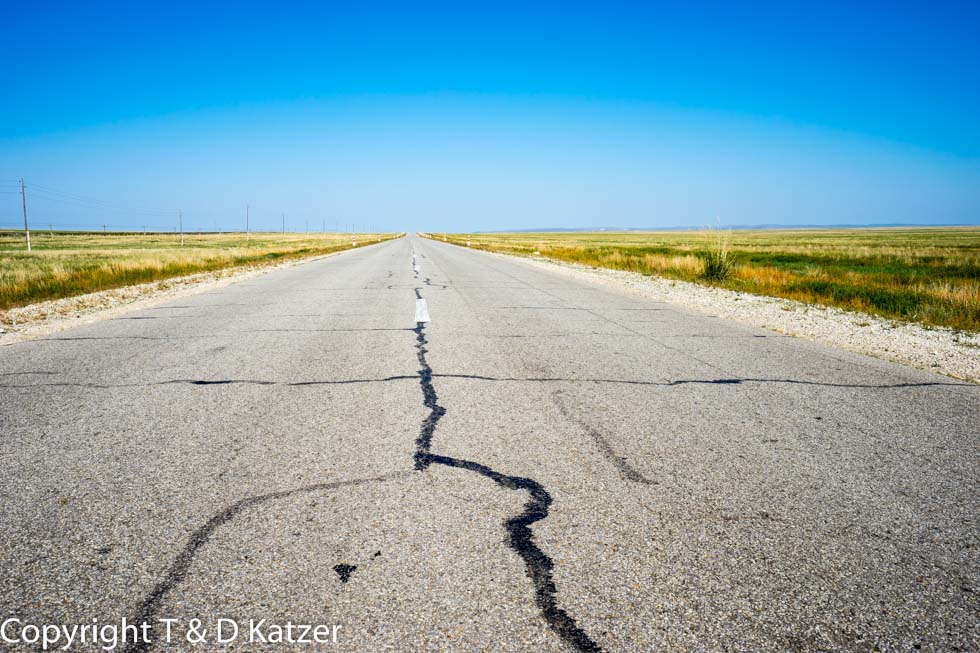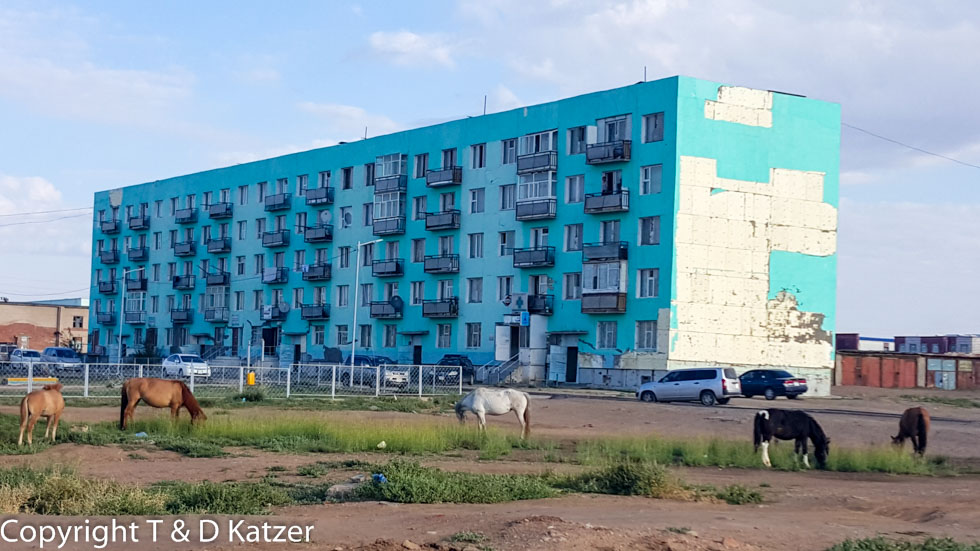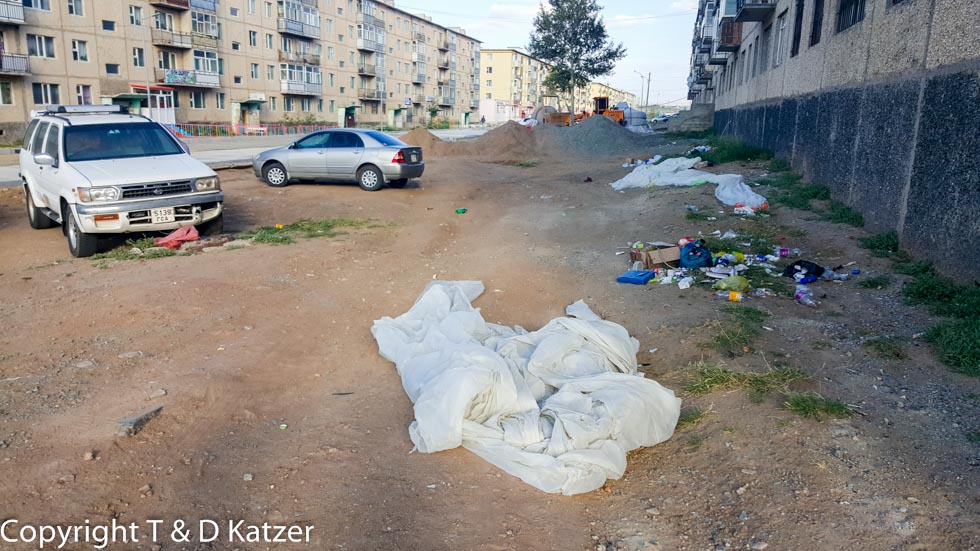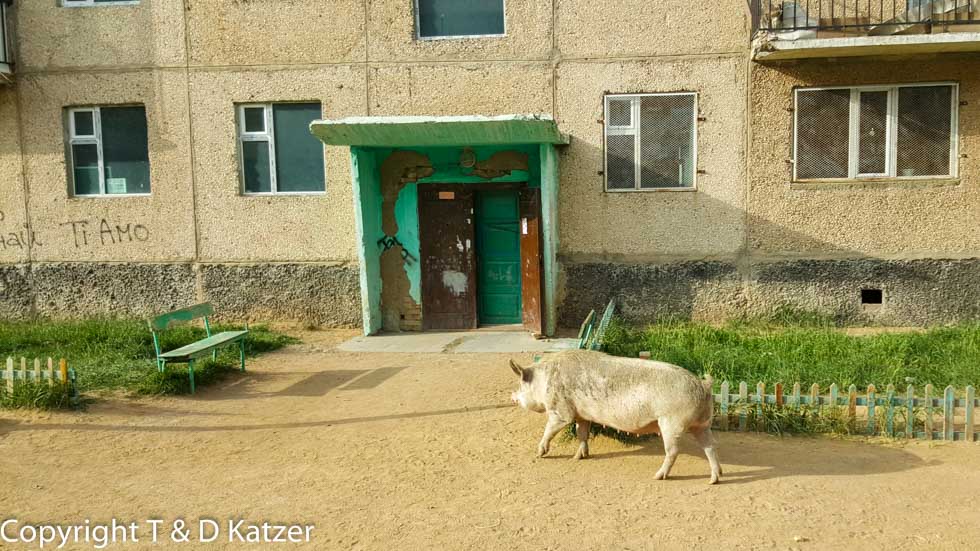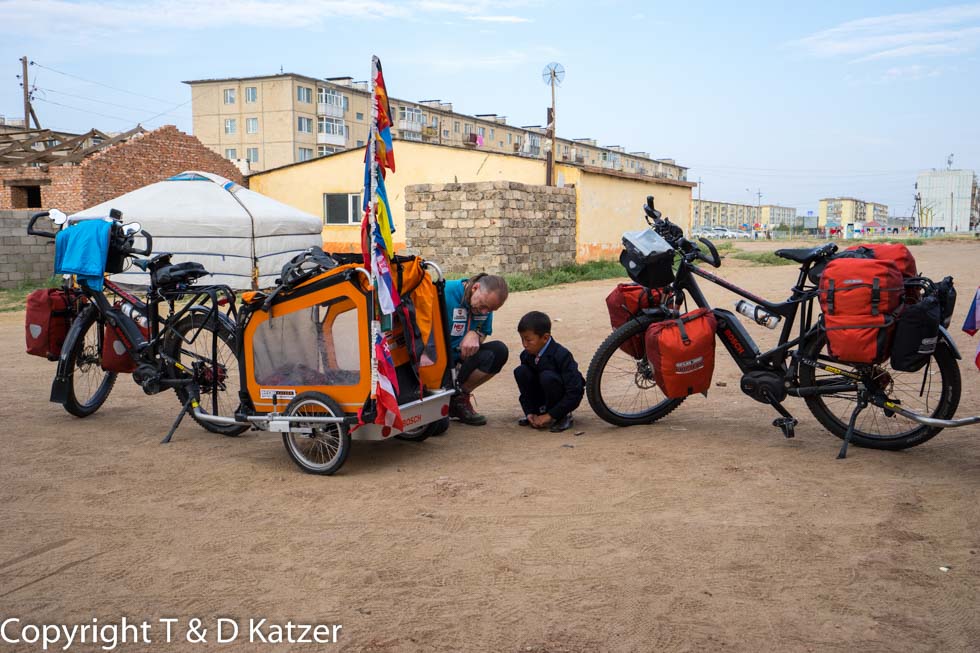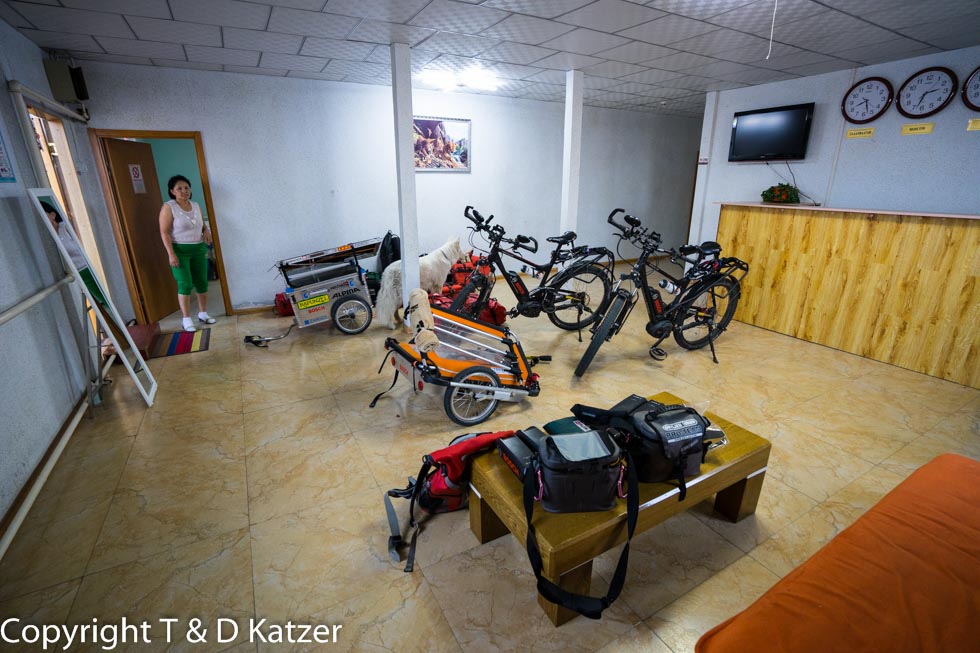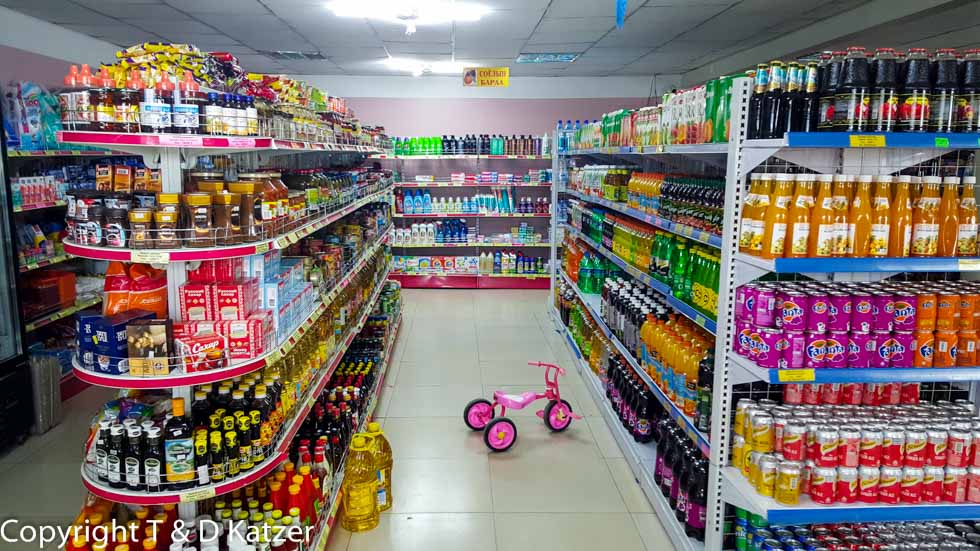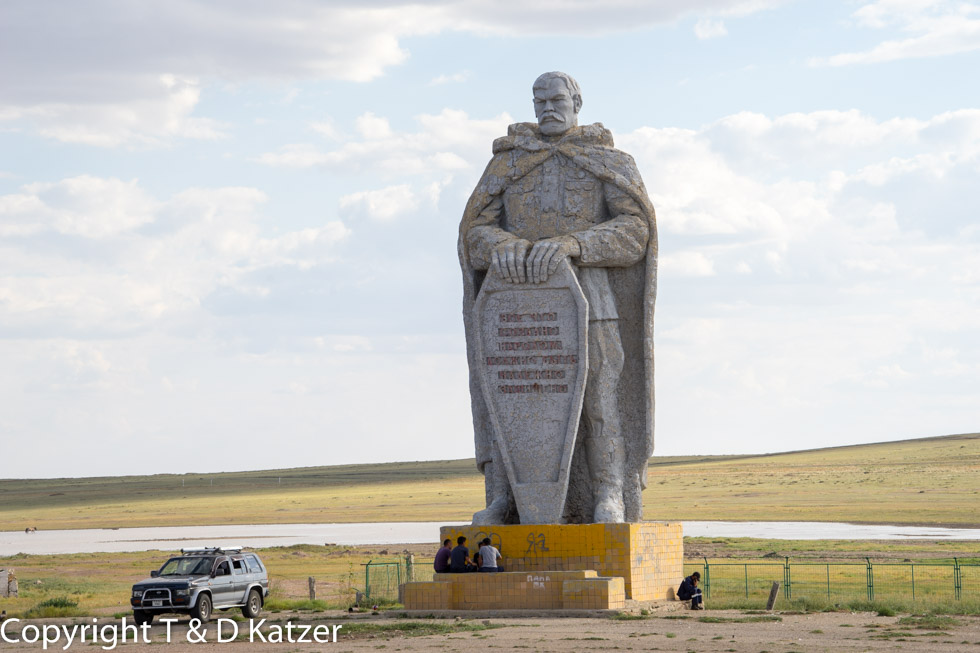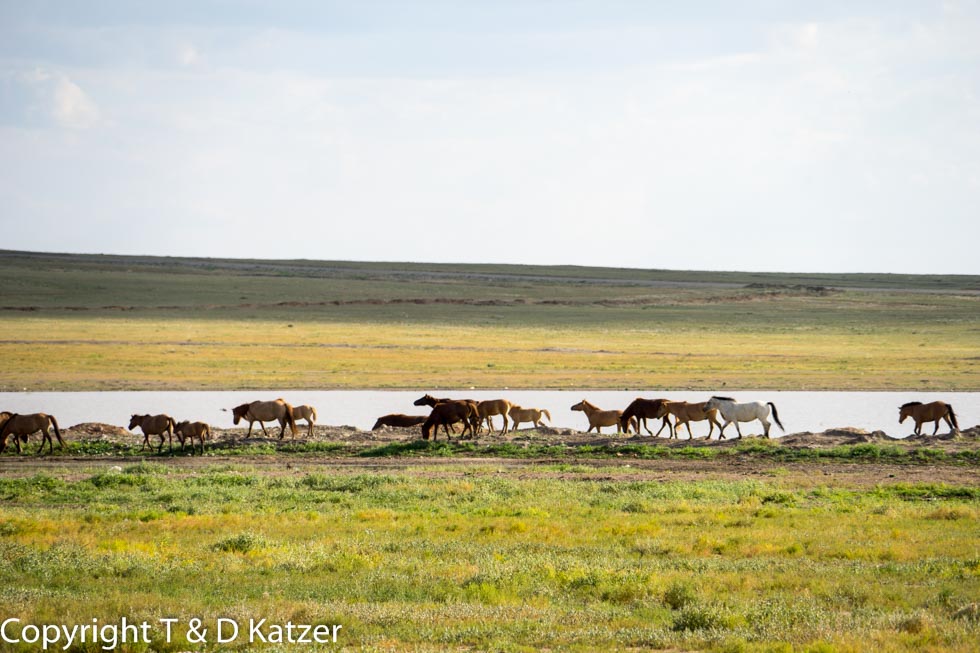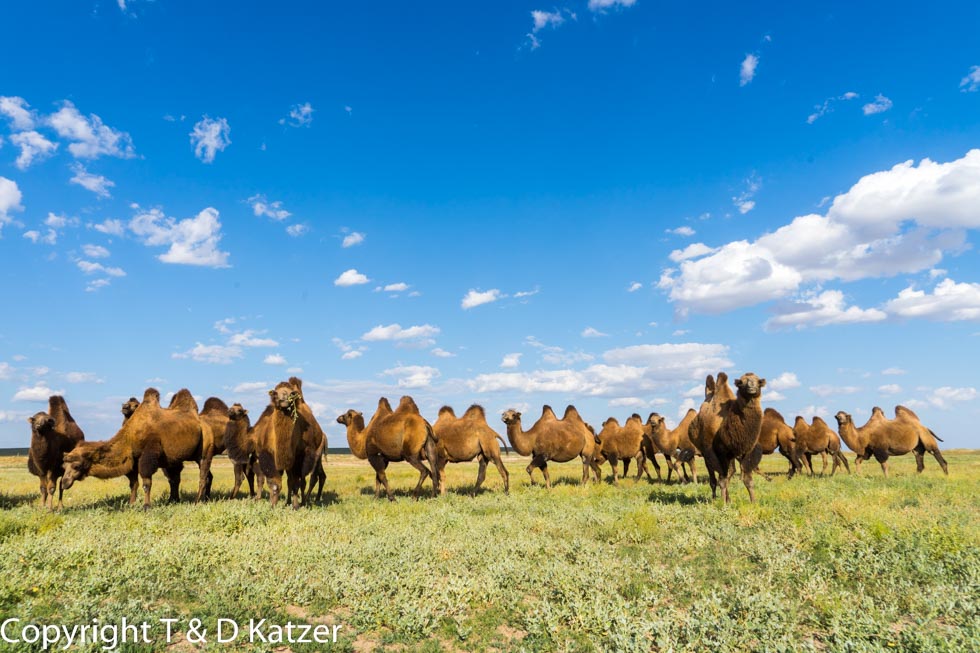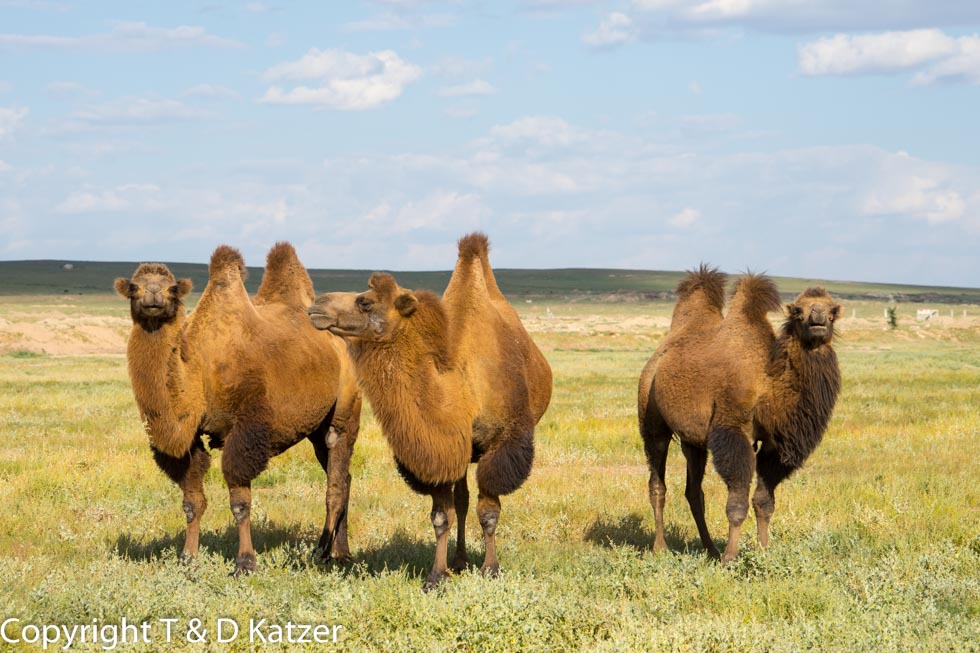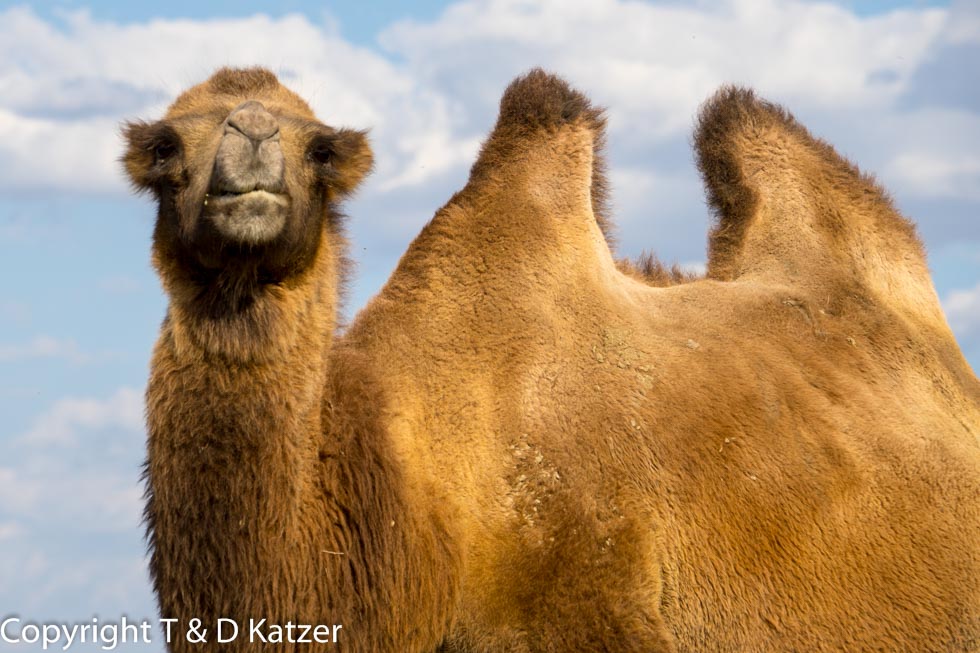
Birthday and rancid meat
N 46°21'03.3'' E 108°23'30.1''
Date:
30.08.2015 to 31.08.2015
Day: 63 – 64
Country:
Mongolia
Place:
Tschoir
Latitude N:
46°21’03.3”
Longitude E:
108°23’30.1”
Kilometers per day:
79 km
Total kilometers:
8,801 km
As the crow flies:
70 km
Aver. Sib.
23.7 km/h
Maximum speed
40 km/h
Travel time.
3:18 hrs.
Ground conditions:
Asphalt very poor in places
Maximum altitude:
1,300 m
Total altitude
3,530 m
Altitude meters for the day
13 m
Sunrise:
07:02 a.m.
Sunset:
8:32 pm
Temperature day max:
28 °C
Departure:
09:00 am
Arrival time:
14:00
(Photos of the diary entry can be found at the end of the text).
It’s 7:00 am. The abdominal cramps have increased fatally. I quickly get up, congratulate Tanja on her birthday somewhat unromantically and hurry downstairs to go to the outhouse. The house is locked up as if it were Ford Knox. After opening three locks, I stand in front of the iron outer gate. “Oh no!” I shudder as this is also locked with a fat lock. As best my increasing stomach cramps allow, I storm back into the building, up the stairs and look for the landlady. “I think she’s still asleep,” says Tanja. “She’s still asleep? And at this time of night? I have to go to the toilet and the gate to the outside is locked. I can’t stand it any longer. I’ll just wake her up,” I say and knock on the door opposite our room. It takes half an eternity before I hear a rustling sound and another eternity before the door opens. It is now 7:30 am. I stand there in a tense posture and ask them to unlock the outer gate. “Tijmee”, (Yes) she whispers sleepily and creeps down the stairs like a snail. I follow in her footsteps. It can only be seconds before I’m torn apart. A year later, it seems to me, the iron gate is open. Because of the pressure, I can now only crawl like a snail to the outhouse 50 meters away. It was nothing short of a miracle to get there in one piece and get rid of the horrible potato salad and the even more horrible Buuds.
At 9:00 a.m. I heave my martyred body onto the Brooks saddle. “Well, you don’t look fit either?” I ask Tanja. “I’ve had better birthdays. My stomach feels totally distended,” she replies without the usual verve in her voice. Tired despite the rest day, we let our cranks spin and head south on a straight road. To the left and right of the endless narrow highway called Highway A0102, the land is now as flat as if God had drawn a ruler over it when he created this country. “That’s her!” I shout. “What is she?” asks Tanja. “Well, the Gobi! We’re in the foothills of the Gobi Desert!” Headwinds reduce our speed and drain our batteries despite the fantastic weather. The thought of staying here because of a lack of energy is frightening. Only a few cars or trucks whiz past us like jets from time to time. At 28 °C in the shade, it’s actually a beautiful day for cycling. If it weren’t for the incessant rumbling in my stomach. “Shit food,” I grumble to myself, having few eyes for the unconventional and beautiful landscape. After about 45 kilometers, another roadside restaurant welcomes us. If we weren’t forced to charge our batteries, I would certainly have given such a building a wide berth by now. We lean our e-bikes against the wall of the house, tie Ajaci up in the shade, take off the handlebar bags and sit down in the pub. “Can I charge our batteries?” I ask before we place the order, because we want to eat something to compensate for being allowed to charge here. A middle-aged Mongolian woman pulls the TV plug out of the socket and offers me the chance to tap the energy I need. “What do you want to eat?” calls Tanja, who is just placing the order. “What this man is eating looks quite good,” I reply, pointing to a guest’s dish. “Goulash, that’s goulash,” answers Tanja. I just nod when I see that the charging lights on our Bosch batteries aren’t flashing. The grid capacity is obviously not sufficient.
“I hope we can still make it to Tschoir. From now on, we should no longer drive in sport mode but in tour mode,” I say as the goulash is served. Despite a messed up stomach, we feel a ravenous appetite. I ignore the exceptionally intense-tasting meat. “Do you like it?” I ask. Tanja nods. “And you?” “I don’t know. Somehow the meat in this country is always rancid. I just can’t stand the taste anymore,” I say, leaving the rest for Ajaci, who is now also suffering from diarrhea.
As soon as we sit on our bucks again, we both feel sick. “I don’t believe it. We haven’t even digested yesterday’s meal and we’ve already caught something again. That’s not possible. If this goes on, we won’t make it to China,’ I worry.
After almost 80 kilometers, we reach the desolate little town of Tschoir, which is home to around 7,800 people, with only a little energy left in the battery. We let our bikes roll through the very ugly village. The former Soviet military base boasts that it has electricity and a water supply, and those who live in one of the terrifying prefabricated buildings even get hot water in the winter, which can be as cold as minus 37°C.
“Haana buudal?” (Where is a hotel), I ask some cab drivers. They point to one of the many angular, ugly four-storey prefabricated buildings. “Oh no. I don’t fancy having to carry our equipment and bikes up to the fourth floor,” Tanja snorts. Then the driver of a van agrees to show us another hotel at ground level on the outskirts of the city. We follow him. Children play happily in the playgrounds that have been set up between the buildings and cheer us on. We raise our hands tiredly in greeting. Then we stand in front of the little house, which actually has an illuminated hotel sign on it. We are allowed to put our bikes in the lobby and are given a small room for 40,000 tugrik (€17.79).
As soon as we have checked in, Tanja has to vomit several times. She lies in bed for the rest of the day, trying to recover from another bout of food poisoning. Apart from the many congratulations she receives via WhatsApp, text message, Facebook, guestbook and email, the only good thing I can offer her on her modest birthday is a small can of Coke from the nearby supermarket. “I hope the sugar in there gives you some energy,” I say.
The next morning we are both too weak to cycle just one kilometer. The abundance of spoiled food really knocked us out and robbed us of all our strength. Regardless of whether we need to charge our batteries, we promise never to visit a Mongolian street restaurant again. In the morning we eat white bread dipped in tea and at lunchtime Tanja cooks pasta in a pot with electricity borrowed from the receptionist. I’m sitting in front of the steaming pot, ravenous and can’t wait for the pasta we’ve just bought at the supermarket to be ready. “Finally, no rancid meat, just pasta with ketchup,” I say. Then the time has come. Tanja, who is feeling better again at this hour, puts noodles on my plate. We sprinkle some Parmesan cheese on top, which was included in the packet. Although the noodle dish was imported from Germany, it tastes strange. “The cheese. It’s the cheese,’ I remark after my plate is almost empty. “Do you think he has something too?” asks Tanja, unsettled by her recent experiences. “Can you see the best-before date on the pack?” I ask. “Hm, let’s see. Produced in January 2015 and shelf life until September 2015, so it’s still good.” “Still good? It gets almost 40 °C in the shade here in summer. Who knows how often the pack has had to sweat. And what cheese is supposed to keep for nine months under these conditions? It’s clearly spoiled,” I say, smelling the pack. “It’s getting desperate. What else are we supposed to eat? Even the food from the supermarket is dangerous,” I grumble, remembering the spoiled tin of fish in the town of Darkhan that sent me to bed for two days a few weeks ago.
So that our dog gets his exercise, I take him for a walk around the houses in the afternoon. Just behind our accommodation, the largest surviving Russian statue stretches its mighty head into the sky. I sit down on a small mound of earth and look at it in the evening sun. Just a hundred meters further on, a herd of horses gallops across the steppe towards the golden rays of the sun and a herd of camels grazes not far from us. We get within a few meters of it. “Don’t scare them away Ajaci. They are great animals. Tanja and I have covered over 12,000 kilometers with them in many countries of this beautiful world. You know, for me, these creatures are a cross between a horse and a lion. What’s more, they are almost as intelligent as elephants.” Ajaci dutifully sits down next to me and eyes the large desert animals suspiciously. “They won’t hurt us,” I reassure him and enjoy the moment in a country that I consider to be one of the most beautiful in the world.
The live coverage is supported by the companies Gesat GmbH: www.gesat.com and roda computer GmbH www.roda-computer.com The satellite telephone Explorer 300 from Gesat and the rugged notebook Pegasus RP9 from Roda are the pillars of the transmission.
